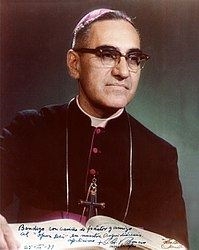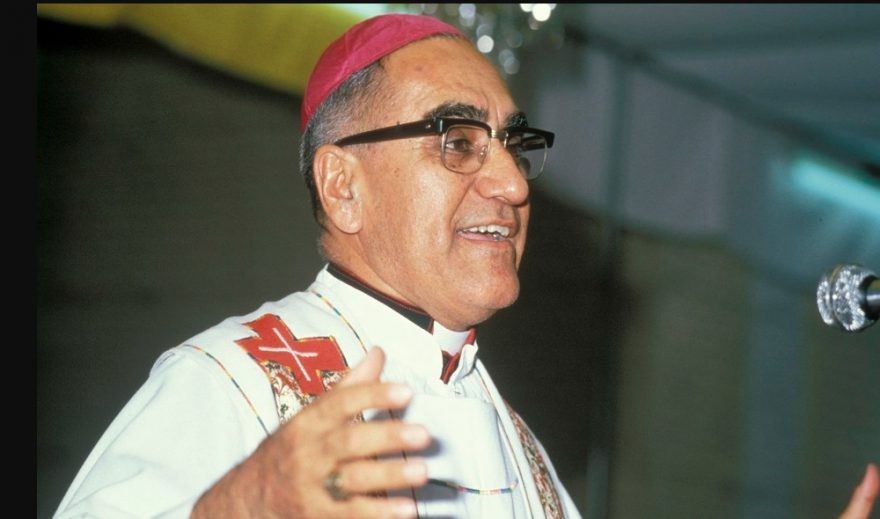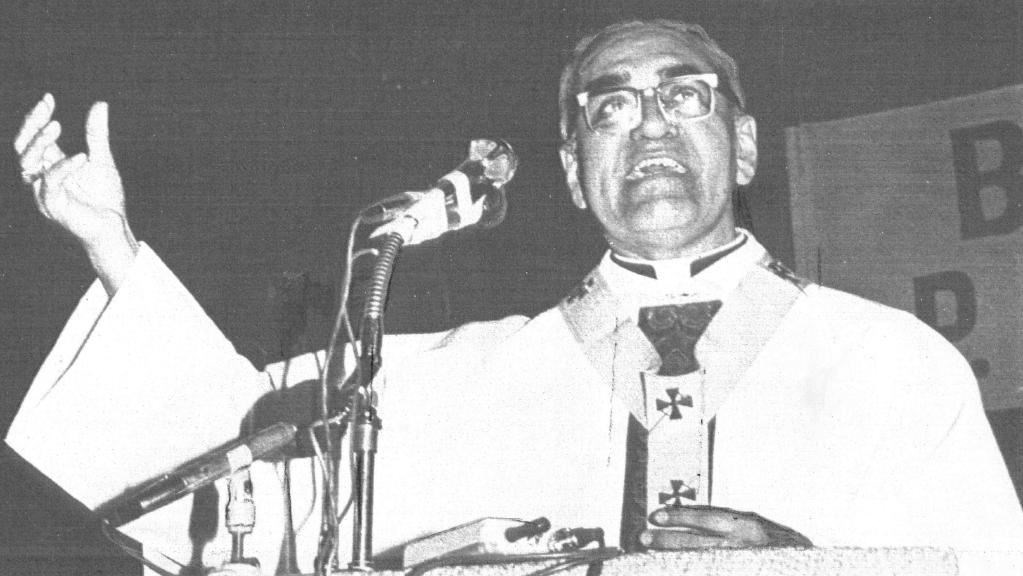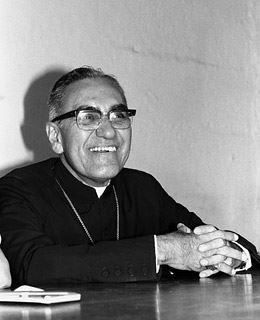 Oscar Romero in his formal Archbishop attirewww.Wikipedia.com The streets of El Salvador buzzed with activity in the 1970’s. Politicians and government leaders ran around, working their way to build a better country. Religious leaders, priests, and devout Catholics prayed in the streets spreading peace. Although nothing seems out of the ordinary, the two crowds began to contradict each other, and the country was turning to violence. Who would bring the two groups back together to build up a safe and prosperous country? Archbishop Oscar Romero was a devout Catholic who liked to keep the balance between religion and politics substantial and steady. He knew politics were important, but shouldn’t override the morals and values of the Catholic faith. When brutality arose from the government, targeting the majority of El Salvador, who were poor but strong Catholics, it was Romero’s job to be brave and heroic to save his fellow Salvadorans from discrimination and violence. Born in 1917, Oscar Romero taught himself to be a Catholic; his family was surprisingly not 100% supportive of the religion. Romero’s first job was at a Catholic broadcast radio station, where he became familiar with the threats and violence their government was posing on their country. Knowing he had to do something about it, Romero quit his job at the radio station and left for Rome to study deeper into the Catholic faith. His goal was to become a priest, despite his family's discouragement. In 1942 he was ordained a priest, and he quickly gained popularity for his peaceful outlook and exemplary morals. Therefore, he was later elected to be the official Archbishop of El Salvador. His platform was now ideal for him to get his message across to the corrupt government. A hero must possess bravery and the courage to put others before yourself, even if it means your own life could be on the line. Romero was so brave to stand up to the government’s discrimination, threats, and violence that he put his own life at a high risk to save lives and promote peace. And even after all his hard work, he, too, was assassinated at only age 62. Archbishop Oscar Romero used his influential platform to fight for the civil rights and peace for his country's people during violent times. Because he exemplified bravery and courage not only towards his country, but the world, he is considered a hero to all.
Oscar Romero in his formal Archbishop attirewww.Wikipedia.com The streets of El Salvador buzzed with activity in the 1970’s. Politicians and government leaders ran around, working their way to build a better country. Religious leaders, priests, and devout Catholics prayed in the streets spreading peace. Although nothing seems out of the ordinary, the two crowds began to contradict each other, and the country was turning to violence. Who would bring the two groups back together to build up a safe and prosperous country? Archbishop Oscar Romero was a devout Catholic who liked to keep the balance between religion and politics substantial and steady. He knew politics were important, but shouldn’t override the morals and values of the Catholic faith. When brutality arose from the government, targeting the majority of El Salvador, who were poor but strong Catholics, it was Romero’s job to be brave and heroic to save his fellow Salvadorans from discrimination and violence. Born in 1917, Oscar Romero taught himself to be a Catholic; his family was surprisingly not 100% supportive of the religion. Romero’s first job was at a Catholic broadcast radio station, where he became familiar with the threats and violence their government was posing on their country. Knowing he had to do something about it, Romero quit his job at the radio station and left for Rome to study deeper into the Catholic faith. His goal was to become a priest, despite his family's discouragement. In 1942 he was ordained a priest, and he quickly gained popularity for his peaceful outlook and exemplary morals. Therefore, he was later elected to be the official Archbishop of El Salvador. His platform was now ideal for him to get his message across to the corrupt government. A hero must possess bravery and the courage to put others before yourself, even if it means your own life could be on the line. Romero was so brave to stand up to the government’s discrimination, threats, and violence that he put his own life at a high risk to save lives and promote peace. And even after all his hard work, he, too, was assassinated at only age 62. Archbishop Oscar Romero used his influential platform to fight for the civil rights and peace for his country's people during violent times. Because he exemplified bravery and courage not only towards his country, but the world, he is considered a hero to all.
 Romero preaches an inspirational homily to a large crowdwww.Jacobin.comArchbishop Romero skillfully used his influential platform for a good cause, and stood up for the civil rights of the people of El Salvador. Around the late 1970’s, El Salvador’s government became corrupt towards the peasants and Catholics of the time, which populated almost everyone in the country. The government mysteriously began killing off important and influential Catholics of El Salvador. Violence had arrived, and Archbishop Romero took charge of the situation. Using his already superior platform as a Bishop, he started branching outside of just speaking to his Catholics, but to everyone, so many more could get wind of his inspiration: “After reading the work of liberation theologians and critically reflecting on the socio-political situation in El Salvador, Romero began to speak out against the violence, corruption, and suffering of peasant workers. This brought him into direct conflict with the ruling elite and the government, who often sanctioned or turned a deaf ear to these problems” (Espinosa, Gastón.). While having the unsupportive government criticizing him for stepping outside of his comfort zone as a bishop, he still continued to proclaim his catholic faith while supporting those who had no say just because of their social position. Romero thought this was necessary because peace and love should always overcome hate and violence, no matter the government party you belong to, your faith, or your social class:“Romero continued to preach for an end to poverty and social injustice, and he condemned violence and the persecution of priests working with the poor. His words resonate around the world[…]” (“Archbishop Óscar Romero Is Assassinated: March 24, 1980"). Poverty and social-injustice was El Salvador’s “elephant in the room”. Oscar Romero was not a government leader, yet he still spoke out about the countries civil problems and how to solve them through his powerful homilies. In dangerous times he was not afraid to speak out, even with the government right on his back and the threats of assassination looming.
Romero preaches an inspirational homily to a large crowdwww.Jacobin.comArchbishop Romero skillfully used his influential platform for a good cause, and stood up for the civil rights of the people of El Salvador. Around the late 1970’s, El Salvador’s government became corrupt towards the peasants and Catholics of the time, which populated almost everyone in the country. The government mysteriously began killing off important and influential Catholics of El Salvador. Violence had arrived, and Archbishop Romero took charge of the situation. Using his already superior platform as a Bishop, he started branching outside of just speaking to his Catholics, but to everyone, so many more could get wind of his inspiration: “After reading the work of liberation theologians and critically reflecting on the socio-political situation in El Salvador, Romero began to speak out against the violence, corruption, and suffering of peasant workers. This brought him into direct conflict with the ruling elite and the government, who often sanctioned or turned a deaf ear to these problems” (Espinosa, Gastón.). While having the unsupportive government criticizing him for stepping outside of his comfort zone as a bishop, he still continued to proclaim his catholic faith while supporting those who had no say just because of their social position. Romero thought this was necessary because peace and love should always overcome hate and violence, no matter the government party you belong to, your faith, or your social class:“Romero continued to preach for an end to poverty and social injustice, and he condemned violence and the persecution of priests working with the poor. His words resonate around the world[…]” (“Archbishop Óscar Romero Is Assassinated: March 24, 1980"). Poverty and social-injustice was El Salvador’s “elephant in the room”. Oscar Romero was not a government leader, yet he still spoke out about the countries civil problems and how to solve them through his powerful homilies. In dangerous times he was not afraid to speak out, even with the government right on his back and the threats of assassination looming.
 Romero speaks to his country's government, summoning them to turn away from violence www.dailytelegraph.comOscar Romero exemplifies heroism because he put his own life in danger to fight for the peace of his country's people when the government became violent and corrupt. This next quote gives us an outline of the final goals he wanted to achieve. He tried so hard to keep his people alive, and sent out a strong, final message before his time came unexpectedly: “Foreseeing his own assassination, he intensified his message in his final weeks. On March 23, 1980, he pleaded with the government to stop the repression of dissent, calling on soldiers not to obey orders to murder peasants”(Brockman, J. R.). Archbishop Romero looked past his own violent threats and focused on his peoples. He was more concerned about keeping others alive then himself, which is a true example of how to serve God in a Catholic lifestyle. Romero used his resources to make sure his country was going to be moving forward in peaceful and positive ways, even if it mean he wouldn't be there to experience it himself. He expressed through his words and actions that peace should always overcome violence, even if it takes lots of time and work. Romero was answering his call from God to sort out his country’s violence because he needed to be an example of holiness and selflessness. He kept following his vocation and call to action, so much so that he gained the attention on the world before he died. The amount of peace spread cannot be measured, but it can certainly be recognized, and resulting from that was a nomination for an award that many people can only dream of earning: “Romero's campaign for human rights in El Salvador won him many national and international admirers as well as a Nobel Peace Prize nomination” ("Oscar Romero, Archbishop”). Romero caught the attention of the world without even wanting to. He wasn’t out for recognition, or an award to prove how heroic he was, but received a nomination for the Nobel Peace Prize anyway. Unfortunately, Romero’s bravery and heroes came at a tough price; he was assassinated on March 24th, 1980, along with a few other influential catholics who fought against the government’s unnecessary violence.
Romero speaks to his country's government, summoning them to turn away from violence www.dailytelegraph.comOscar Romero exemplifies heroism because he put his own life in danger to fight for the peace of his country's people when the government became violent and corrupt. This next quote gives us an outline of the final goals he wanted to achieve. He tried so hard to keep his people alive, and sent out a strong, final message before his time came unexpectedly: “Foreseeing his own assassination, he intensified his message in his final weeks. On March 23, 1980, he pleaded with the government to stop the repression of dissent, calling on soldiers not to obey orders to murder peasants”(Brockman, J. R.). Archbishop Romero looked past his own violent threats and focused on his peoples. He was more concerned about keeping others alive then himself, which is a true example of how to serve God in a Catholic lifestyle. Romero used his resources to make sure his country was going to be moving forward in peaceful and positive ways, even if it mean he wouldn't be there to experience it himself. He expressed through his words and actions that peace should always overcome violence, even if it takes lots of time and work. Romero was answering his call from God to sort out his country’s violence because he needed to be an example of holiness and selflessness. He kept following his vocation and call to action, so much so that he gained the attention on the world before he died. The amount of peace spread cannot be measured, but it can certainly be recognized, and resulting from that was a nomination for an award that many people can only dream of earning: “Romero's campaign for human rights in El Salvador won him many national and international admirers as well as a Nobel Peace Prize nomination” ("Oscar Romero, Archbishop”). Romero caught the attention of the world without even wanting to. He wasn’t out for recognition, or an award to prove how heroic he was, but received a nomination for the Nobel Peace Prize anyway. Unfortunately, Romero’s bravery and heroes came at a tough price; he was assassinated on March 24th, 1980, along with a few other influential catholics who fought against the government’s unnecessary violence.
 Romero stayed positive to the endwww.romerotrust.orgArchbishop Oscar Romero exemplified heroism throughout his life by supporting and fighting for the civil rights of El Salvador’s people, but also did it under threats. As he was preaching about spreading peace, he was shot and killed. As Romero once said: "A church that does not join the poor, in order to speak out from the side of the poor, against the injustices committed against them, is not the true church of Jesus Christ" ( Enright, Nancy). Because he fought bravely against violence in support of peace and civil rights, Oscar Romero is considered a hero not only to the people of El Salvador, but those across the world.
Romero stayed positive to the endwww.romerotrust.orgArchbishop Oscar Romero exemplified heroism throughout his life by supporting and fighting for the civil rights of El Salvador’s people, but also did it under threats. As he was preaching about spreading peace, he was shot and killed. As Romero once said: "A church that does not join the poor, in order to speak out from the side of the poor, against the injustices committed against them, is not the true church of Jesus Christ" ( Enright, Nancy). Because he fought bravely against violence in support of peace and civil rights, Oscar Romero is considered a hero not only to the people of El Salvador, but those across the world.
Page created on 2/14/2018 7:15:51 PM
Last edited 2/17/2018 12:10:24 AM
